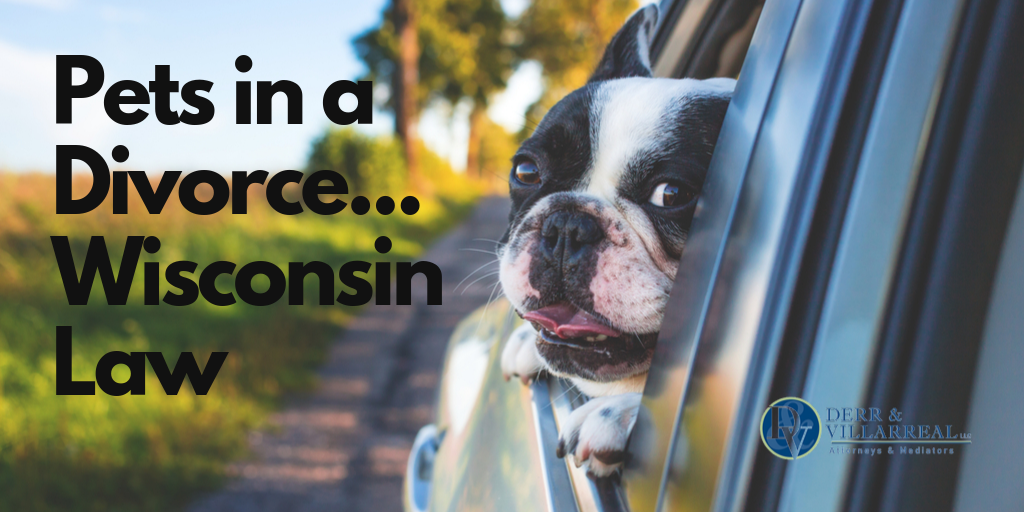
More than 63% of all families have a pet, according to recent surveys. Since 1 in 2 marriages ends in divorce, dealing with shared pets is a common issue in divorce. In Wisconsin, the law considers pets to be personal property, despite the long-standing relationships held between the pet and its owners. Therefore, the Court “divides” pets between owners just like any other property in your home. Here’s what you need to know to understand the issues surrounding pets in a divorce.
Who decides who gets to keep the cat?
Several different individuals decide on property division, depending on which process you take. In divorce litigation, your attorneys may come to a negotiated settlement agreement where they come to a mutual agreement. If your case goes to Court, the Judge will likely approve the final agreement. If you use divorce mediation, you and your spouse will work with a neutral mediator to get to a mutually agreeable decision together. For this reason, if you have pets that are a high priority, you may want to consider mediation to have as much a say in the decision as possible.
What facts are considered for property division?
Since pets are considered property rather than a member of the family, they are treated in the same way as your furniture, cars and home. The Court will take into account the total amount of property owned by both spouses, and how much it is all worth. Usually property is split 50/50, including animals. If you take the dog, you’d likely have to give up something of equal worth. When both spouses want to keep the pet, this process can take much longer, and cost thousands of dollars. The Court will take into account previously-made agreements about who will keep the pet in the event of a divorce. If you own pets before marriage, consider getting a prenuptial agreement that states you maintain separate ownership of the pets.
What if my spouse abuses the pet?
If your spouse has mistreated, neglected or outright abused your pet, you should absolutely bring that up to the Court. However, unlike a situation that involved child abuse, the burden of proof is on you. The Court will not investigate for you – you must provide evidence like photos, medical reports, or eyewitness testimony. Of course, the Court can also rule that both spouses are unfit to keep the animals – make sure you watch your own behavior too.
Our advice: try compromising with your ex-spouse.
At the end of the day, with pets in a divorce, it’s almost always best to come to a private agreement. Meet with your spouse and offer them rights to property that they would like in exchange for the pet. The Judge will almost always accept a compromise agreement between spouses. If you cannot negotiate on your own, consider hiring a divorce mediator, even just to help with that one issue. The mediator will help identify solutions, pros and con’s, prepare all legal documents, obtain signatures, and then submit the agreement to the Court for you.
Pets in Divorce: A Recap
In summary, pets in divorce go through the same process as communal property. If you sign a prenuptial agreement you can maintain sole ownership despite marriage. If not, the pet will be divided by the Court, your attorneys’ agreement, or your own agreement. We recommend trying to come to an agreement out of Court to save time and money and maintain a better working relationship with your spouse. If you are concerned about animal abuse, raise the issue, but be ready to prove your case as well.
Want a more affordable, healthier divorce than court litigation? Click here to learn more about the many benefits of divorce mediation.

 More than 63% of all families have a pet, according to recent surveys. Since 1 in 2 marriages ends in divorce, dealing with shared pets is a common issue in divorce. In Wisconsin, the law considers pets to be personal property, despite the long-standing relationships held between the pet and its owners. Therefore, the Court “divides” pets between owners just like any other property in your home. Here’s what you need to know to understand the issues surrounding pets in a divorce.
More than 63% of all families have a pet, according to recent surveys. Since 1 in 2 marriages ends in divorce, dealing with shared pets is a common issue in divorce. In Wisconsin, the law considers pets to be personal property, despite the long-standing relationships held between the pet and its owners. Therefore, the Court “divides” pets between owners just like any other property in your home. Here’s what you need to know to understand the issues surrounding pets in a divorce.